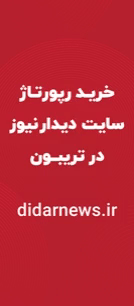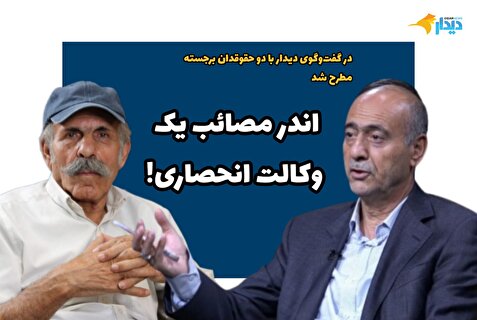

در گفتوگوی دیدار با دو حقوقدان بررسی شد
دیدار به سراغ دو تن از حقوقدانها برجسته رفته و به تشریح وضعیت و مشقات خانواده افراد بازداشتی در اعتراضات دیماه پرداخته است.
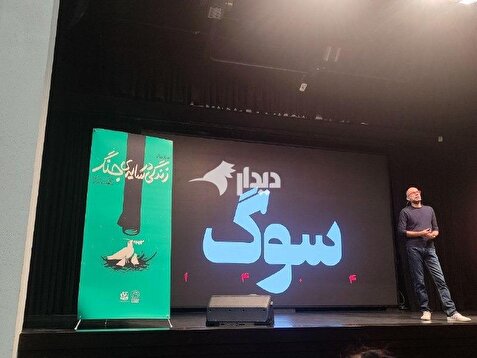
دیدار گزارش می دهد
پوریا عالمی: ما برای بزرگ شدن، باید درخت پیشگی کنیم/فردای هفت سالگی من، خلق بی آیندگی بود!
«زندگی در سایه جنگ»، عنوان رویدادی کاربردی بود که به همت متولیانِ «آی قصه»، مرکز تولید و نشر صوتی قصههای کودک، و مدرسه دایناماینا و با همکاری مؤسسه خیریه رعد برگزار شد.
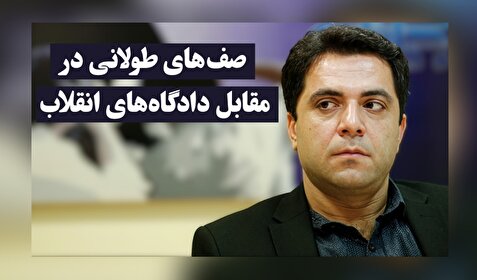
مجتهدزاده، وکیل دادگستری در گفتوگو با مجله خبری دیدارنیوز:
تعداد دستگیرشدگان بسیار گسترده است، در شهرستانها نیز بسیار زیاد است/ از آقای اژهای میخواهیم تا تسلیم این جوسازیها نشود
علی مجتهدزاده، وکیل دادگستری در گفتوگو با دیدارنیوز درباره اعتراضات دیماه و وضعیت دستگیرشدگان میگوید: گرچه آمار رسمی از تعداد دستگیرشدگان اعلام نشده، اما آنچه میبینیم تعداد دستگیرشدگان بسیار...
تیتر امروز

در گفتوگوی دیدار با دو حقوقدان بررسی شد
اندر مصائب یک وکالت انحصاری!/ عبدالصمد خرمشاهی، وکیل باسابقه: چرا باید یک عده خاص با تبعیض وارد مرحله مهمی مثل مرحله دادسرا بشوند؟/ محمد حسین ساکت، قاضی بازنشسته: تبصره ماده ۴۸ به خودی خود از مصادیق بارز رانت است
دیدار به سراغ دو تن از حقوقدانها برجسته رفته و به تشریح وضعیت و مشقات خانواده افراد بازداشتی در اعتراضات دیماه پرداخته است.

دیدار گزارش می دهد
پوریا عالمی: ما برای بزرگ شدن، باید درخت پیشگی کنیم/فردای هفت سالگی من، خلق بی آیندگی بود!
«زندگی در سایه جنگ»، عنوان رویدادی کاربردی بود که به همت متولیانِ «آی قصه»، مرکز تولید و نشر صوتی قصههای کودک، و مدرسه دایناماینا و با همکاری مؤسسه خیریه رعد برگزار شد.

مجتهدزاده، وکیل دادگستری در گفتوگو با مجله خبری دیدارنیوز:
تعداد دستگیرشدگان بسیار گسترده است، در شهرستانها نیز بسیار زیاد است/ از آقای اژهای میخواهیم تا تسلیم این جوسازیها نشود
علی مجتهدزاده، وکیل دادگستری در گفتوگو با دیدارنیوز درباره اعتراضات دیماه و وضعیت دستگیرشدگان میگوید: گرچه آمار رسمی از تعداد دستگیرشدگان اعلام نشده، اما آنچه میبینیم تعداد دستگیرشدگان بسیار...
Didar's interview with Hooman Majd
Hooman Majd:The lock on reviving “JCPOA” will finally be broken
کد خبر: ۸۳۵۵۰
۱۱:۳۷ - ۲۹ اسفند ۱۳۹۹
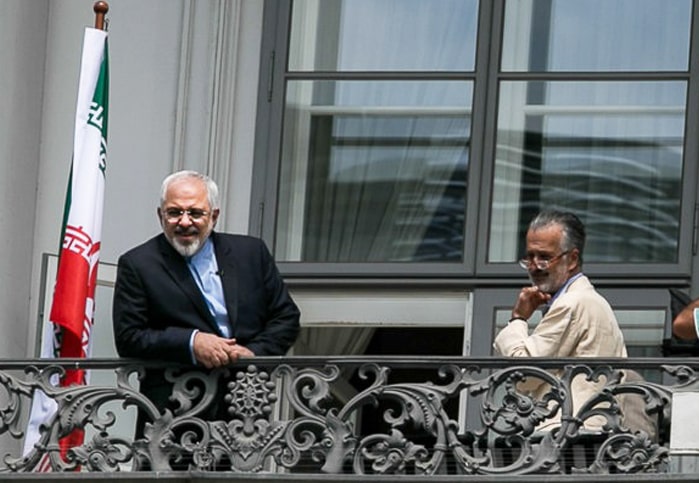
Didarnews:This year from the very beginning (1400) holds a symbolic significance for Iran and the Iranians who are struggling with a multitude of crises these days. Nowruz’s colloquys are an attempt to explore the present events and a glimps to the future of Iran.What will be the relations between Iran and the United States be in 1400? Hooman Majd believes that the lock on the revival of “JCPOA” will finally be broken, but in the Biden era there will be no major change in Iran-US relations.
parastoo bahrami rad:The year 1400 is the year of presidential elections in Iran. On the other hand, the process of reviving “JCPOA” and Washington's return to this agreement are very Ambiguous. Accordingly, the year 1400 will probably have special and important conditions for Iran's foreign policy. To review the upcoming challenges and conditions of Iran's foreign policy the following year,Didar news met with Iranian-American journalist Hooman Majd and other people who were present during the 5 + 1 negotiations.
Read the rest of this conversation and also see the Persian text of this colloquy here.
What are the most important challenges of Iran's foreign policies in Middle East and the rest of the world?
I think the primary challenge will be to resolve the nuclear issue so that Iran can be free of most sanctions, and can re-integrate with the world economy. Secondarily, relations with the Arab states of the Persian Gulf will need to be a priority, given that they are overwhelmingly anti-Iran, fear it, and believe they are at risk of Iranian hegemony.
Assuming that bring the JCPOA back to life will be possible in some form under the new US administration, clearly outreach to Arab neighbors will require some finessing, especially in light of the Abraham Accords and the Arab states’ formal relations with Israel.
Iran’s foreign policy, in my opinion and certainly sitting from a distance, will have some tall challenges ahead, both in the reminder of President Rouhani’s term and not the next Iranian president’s administration.
While other powerful countries in the region have the same policies, why is it that only Iran's regional and defence policies are constantly targeted with such problematic questions?
It’s a good question. From the perspective of the U.S. and most of Western Europe, Iran’s so-called “behavior” is what is troublesome. The notion that it has created a “Shia Crescent” in the region through proxies, effectively controlling foreign capitals, is alarming to the Sunni states and particularly those with large Shia minorities. And those states are closely allied to both the U.S. and Europe, and now Israel. Iran’s threats against Israel, certainly the way they have been framed or described in the west, have contributed to a notion—false, according to many Iranian leaders—that Iran intends to bring about the destruction of Israel through military means.
What has also soured the U.S. and some European nations on Iran is the issue of human rights, and especially on their dual citizens in prison. The assumption here is that they are innocents caught up in a soft war, and are hostages that Iran knows are innocent. It must also be remembered that there is a substantial Iranian diaspora in the west; whether in the U.S. or Europe, and there are those either outright opposed to the Islamic Republic system (and can influence politicians through lobbying activities), or opposed to some of the policies of Iran regarding human rights.
So Iran, which also does not ally itself with any western country in the way that Arab Persian Gulf states do, or even some of the non-Arab neighbors do, is a ripe target for pressure as it is in the nature of the western industrial powers, and especially the U.S., to want their allies to follow their policies (as the Shah did before the revolution).
What will be the process for the joint comprehensive plan of action (the Iran nuclear deal) and will Joe Biden return to it?!
Clearly, as has been repeated in recent days, the Biden administration wants a return to compliance with the JCPOA by all parties. The best way to achieve that would be if Iran and the US took agreed upon steps—compliance-for-compliance—and Iran, through both Foreign Minister Zarif and President Rouhani, has indicated that it is prepared for that scenario, but so far it seems there is a stale mate on who goes first. I have to assume that at some point the stale mate will be broken, as Iran and the U.S. clearly recognize it’s in the interest of both to have the JCPOA survive. At this point, there is quite a bit of opposition in the U.S. and among some allies to Biden lifting sanctions on Iran, and that is a reason perhaps that the U.S. would prefer to take things slowly. The danger is that going too slow will result in an unnecessary crisis or will make reaching full compliance by both countries impossible.
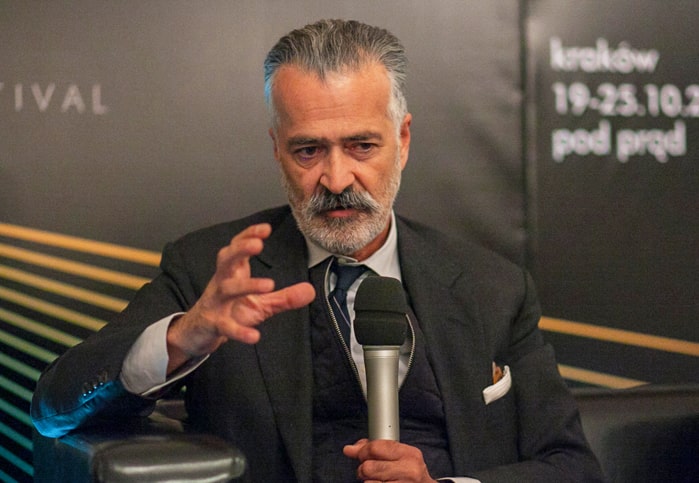
Which turn will the Iran-US relations take during Biden's term?
I don’t think we’ll see a major development in Iran-US relations during his term, other than the possibility of sanctions relief resulting from an agreement to rejoin the JCPOA and abide by UN Security Resolution 2231. There is simply too much bad blood between the two countries, starting with the hostage crisis of 1979 and the break in diplomatic relations, for there to be a huge improvement in relations in the next 4 years. That said, the antagonism that existed during the Trump administration, the downright vengeful attitude of some members and desire for regime-change by some, has already dissipated and will probably not exist again in the future. There can be a sort of uneasy truce following a return to the JCPOA and there could be negotiations on other issues that will probably drag on well past Biden’s first term.
What is Biden's government's general position towards the middle east? What policies will they be following regarding Saudi Arabia and Israel?
There is no question that the carte blanche that the Trump Administration gave to both Israel and the Saudis is no longer in effect. It definitely seems that Biden would prefer to see the U.S. less engaged militarily in the region, and has already shown it will put pressure on its allies if it disapproves of their policies or behavior. Stopping US support for the Saudi war on Yemen is the first example. There will probably be a more even handed policy toward Israel and the Palestinians, and while Biden would certainly like to see a peace treaty, he most probably recognizes that that is out of reach for now. (And it is likely he won’t further pursue the Trump (Kushner) “Peace to Prosperity” plan for peace between Israel and Palestine.) Beside all that, his priorities in foreign policy lay elsewhere.
Finally, how will Iran be after the nuclear challenges? Assuming there will be a solution to the problem in Biden's government, will Iran have a presence in the region and even in the world more powerful than before?
I assume Iranians inside Iran have a much better idea of what Iran’s position will be after we assume the nuclear issue is resolved, but I don’t see any way that its influence in the region will be in any way reduced. Iran has, even under the heaviest of sanctions, increased rather than decreased its influence, and projected its power. While the setbacks such as the assassination of General Soleimani have caused some damage, thee is no reason to think that Iran will not be a heavyweight in the region and will continue to be a decisive factor in conflicts ranging from Afghanistan to Syria. While some argue that if sanctions are lifted Iran will become even more powerful and dangerous, I would argue that if its economy improves and the standard of living of its people goes up dramatically, Iran will have every reason to continue to reach out a hand to its neighbors to try to come arrangement for security for all (such as Rouhani’s HOPE, or some other initiative that a new president may come up with).
امروز يکشنبه ۲۶ بهمن
امروز يکشنبه ۲۶ بهمن
امروز يکشنبه ۲۶ بهمن
امروز يکشنبه ۲۶ بهمن

